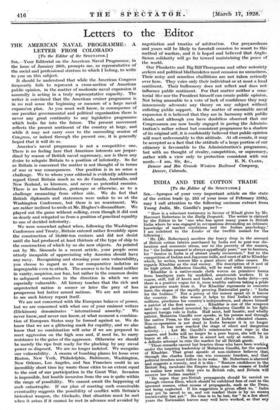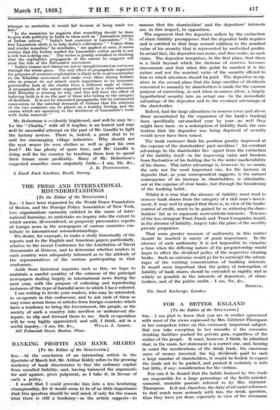INDIA AND THE COTTON TRADE
[To the „Editor of the SrEcrxroa.1 Sm,—Apropos of your very important article on the state of the cotton trade (p. 253 of your issue of February 25th), may I call attention to the following• ominous extract from Young India, Mr. Gandhi's paper ?— _
"Here is a reluctant testimony in favour of Khadi given by
Harcourt Robertson in the Daily Despatch. The writer is claimed by the Editor to be 'one who has spent many years in British India where he was engaged in occupations demanding an intimate knowledge of market conditions and the Indian psychology.' I am indebted to the Leader of the twelfth instant for the following : He (Mr. Robertson) ascribes the heavy drop in the amount of British cotton fabrics purchased by. India not to post-war dis- location and economic stress, nor to the poverty of the masses, for" the Indian peasant is always appallingly poor," nor to famines, for "famine in India is of almost yearly occurrence " but to the competition of Indian and Japanese mills, and most of all to Khaddar which, he writes, towers like a giant above all other causes. He regards Khaddar as the real enemy. His description of it and of its high priest, Mahatma Gandhi, will be read with interest :
Shedder is a native-made cloth woven on primitive looms from handspurt yarn by unskilled, amateurish workers. It is coarse, stiff, full of knots and faults, and always looks dirty--yet there is a positive vogue for it, even wealthy natives taking a pride in garments made from it. 'For Khaddar represents in concrete form the slogan of the rapidly growing Nationalist party.: "India for the Indians" Not a penny of the money spent on it leaves the country. He who wears it helps to feed India's starving millions, proclaims his country's independence, and shows himself
a patriot of the first water Khaddar is one of the weapons used by—and indeed invented by—Mahatma Gandhi in his fight against foreign rule in India. Half saint, half fanatic, and wholly patriot, Mahatma Gandhi now speaks, in his person and through the native Press, to the very hearts of India's educated classes. Non-co-operation is not dead in India because it is no longer talked. It has now reached the stage of silent and dangerous activity. . . . Let Mr. Gandhi's missionaries once rope in the masse and India will no longer be a poor buyer, she will be no s,
buyer at all. . . . The blow is aimed not only at cotton. It is a definite attempt to ruin the market for all British goods. These remarks cannot but hearten those who have been working under the inspiring leadership Of Mahatma Gandhi, for the spread of Shedder. That great apostle of non-violence believes that through the charka India can win economic freedom, and that political freedom must follow in its wake. Mr. Robertson is alarmed' and suggests a remedy, and it is this : "Restore confidence in the British Raj, inculcate the Empire idea,c ause the masses of Indite to realise how much they owe to British rule, and Britain will recover her Indian market." He urges that pro-British propaganda should be carried on through cinema films, which should be exhibited free of cost to the ignorant masses, other, means of propaganda, such as the Press, not being neglected. If his suggestion is given effect to, " India may yet be saved to us, and our market there is by no meanr( irretrievably lost yet." No time is to be lost, for" in a few short years the Nationalist leaven may well have worked, so that any
attempt to neutralise it would fail because of being made too late."
'In the meantime he suggests that something should be done to -give wide publicity in India to ideas such as Lancashire fabrics of Indian cotton," India's best customer is Lancashire," "To buy Lancashire cloth is to help India's cultivators."" Unless these and similar remedies," he concludes," are applied at once, it seems certain that the Indian market for Lancashire cotton goods is not
• a sick but e dying one." The writer is greatly mistaken in thinking -that the capitalistic propaganda of the nature he suggests will stem the tide of the Nationalist movement.
• 'India's masses and classes are not so unsophisticated as not to see through the whole game. The only effect of propaganda organized for purposes of economic exploitation is likely to be to give a stimulus to. the K !ladder movement and make even those among Indians who at present do not attach much importance to its economic potentiality look at the charka from a different angle of vision. -A propaganda of the nature suggested would be a clear admission that Khaddar is winning its way, and this will have the effect of inducing faith in it on the part of those who belong to the category of doubters. It is not by interested propaganda, but by substantial concessions to the national demands of Indians that the relations of the two countries can be placed on a healthy footing, and the causes which are operating to the detriment of Lancashire's trade with India removed.'"
Mr. Robertson is evidently frightened, and well he may be ; for the " Charka," with all it implies, is an honest and may well be successful attempt on the part of Mr. Gandhi to fight the factory system. There is, indeed, a great deal to be said for encouraging village industries. Why should not .the ryot weave his own clothes as well as grow his own food' He has plenty of spare time, and Mr. Gandhi is doing well for his country by teaching them how to spend :their leisure more profitably. Many of Mr. Robertson's suggested remedies seem singularly futile.—I am, Sir, &c.,
J. B. PENNINGTON.
5 Ewell Park Gardens, Ewell, Surrey.











































 Previous page
Previous page